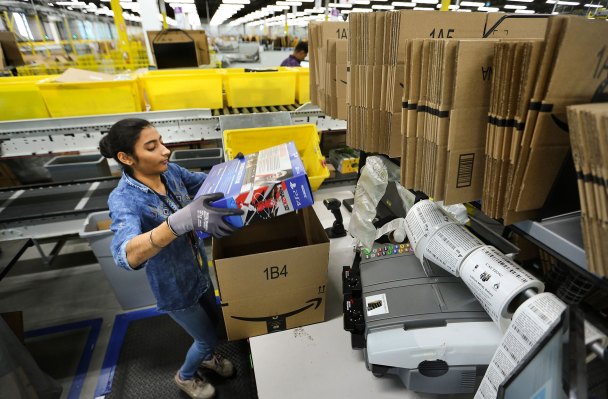It’s strange that no matter how hard Amazon denies that its warehouses are terrible, dangerous places to work, the reports to that effect just keep coming out. Not only that, but now a whistleblower alleges the company worked with Indiana officials to erase a workplace safety violation that cost a man his life.
Reveal News reports the whistleblower’s account of Phillip Lee Terry’s death in 2017 and the subsequent efforts to shift blame from Amazon to the deceased. The full report is worth reading; it implicates Amazon, the head of Indiana’s Occupational Safety and Health Administration (OSHA), and even the governor.
The short version is this: Terry died on the job in a forklift accident. An investigation conducted by the whistleblower, John Stallone, found that Amazon had failed to provide adequate safety training. Citations were issued and $28,000 in fines proposed. But Stallone’s boss, IOSHA’s director, directly contacted Amazon and discussed how they might reduce those fines and place the blame on Terry.
Stallone knows this because he was in the room and recorded the conversation, which Reveal News listened to. Amazon told TechCrunch that it “worked directly with [IOSHA] during the inspection and in follow-up discussions to provide Mr. Terry’s training records.” When I asked directly whether the company disputed Stallone’s account of the call, the representative suggested I contact the Indiana state government instead.
A few days later, Stallone said, he was called into the office of Indiana’s Labor Commissioner, Rick Ruble, and found the governor, Eric Holcomb, there as well. He was told to stop pursuing the case, according to Stallone’s account, because of — you guessed it — Indiana’s aspirations to host Amazon’s HQ2.
Stallone soon quit, and a year later, the fines were reversed and all four safety violations were struck from the record. Instead it is listed as an “unpreventable employee misconduct,” meaning Terry was legally responsible for his own death — counter to the conclusions of the investigation, which had Terry’s coworker on the record stating Amazon had failed to provide proper training.

Governor Holcomb retaliated with a statement denying any involvement with a Labor Department case, denying he ever had the meeting Stallone describes, called the allegations “fabricated” and the report “irresponsible and deliberately misleading… heinous lies.”
It’s hard to imagine why Stallone would fabricate such a meeting, when other efforts by state officials to quash these violations and fines are on record. It has not yet been shown beyond the two competing claims whether the meeting indeed took place, but presumably it was informal anyway, which provides the governor plausible deniability.
Update: Amazon added another statement on the matter, calling the idea that it pressured regulators “absurd” and that “we stand by the findings of the investigation and that appropriate safety training was provided to Mr Terry.” When I asked if they meant the original investigation, in which safety training was found seriously wanting, the Amazon representative said that “IOSHA reviewed our defense and found that it [i.e. the training requirement] was met, which included required employee training and other elements of the defense. Stallone, who was a compliance officer, made findings, but they were not a legal finding.” Well, certainly not after they were erased from existence.
This would all be harder to believe if we hadn’t seen the frenzy of servility Amazon’s HQ2 announcement provoked nationwide. Or if the allegations of poor working conditions at Amazon warehouses hadn’t continued to pile up in the meantime. Reveal’s investigations related to the whistleblower’s case show an alarmingly high number of injuries at Amazon’s facilities.
In a statement, Amazon said that it takes “an aggressive stance on recording injuries no matter how big or small,” leading to higher numbers than other, similar work environments. As usual, workers at the warehouses dispute Amazon’s account, recalling systematic efforts to under-report and increases in injuries coming from automation.
One thing is certain: Ordering from Amazon during the holidays adds pressure to a warehouse system that by many accounts is already operating at superhuman levels — with very human costs. Perhaps shopping local is a better move this year.
